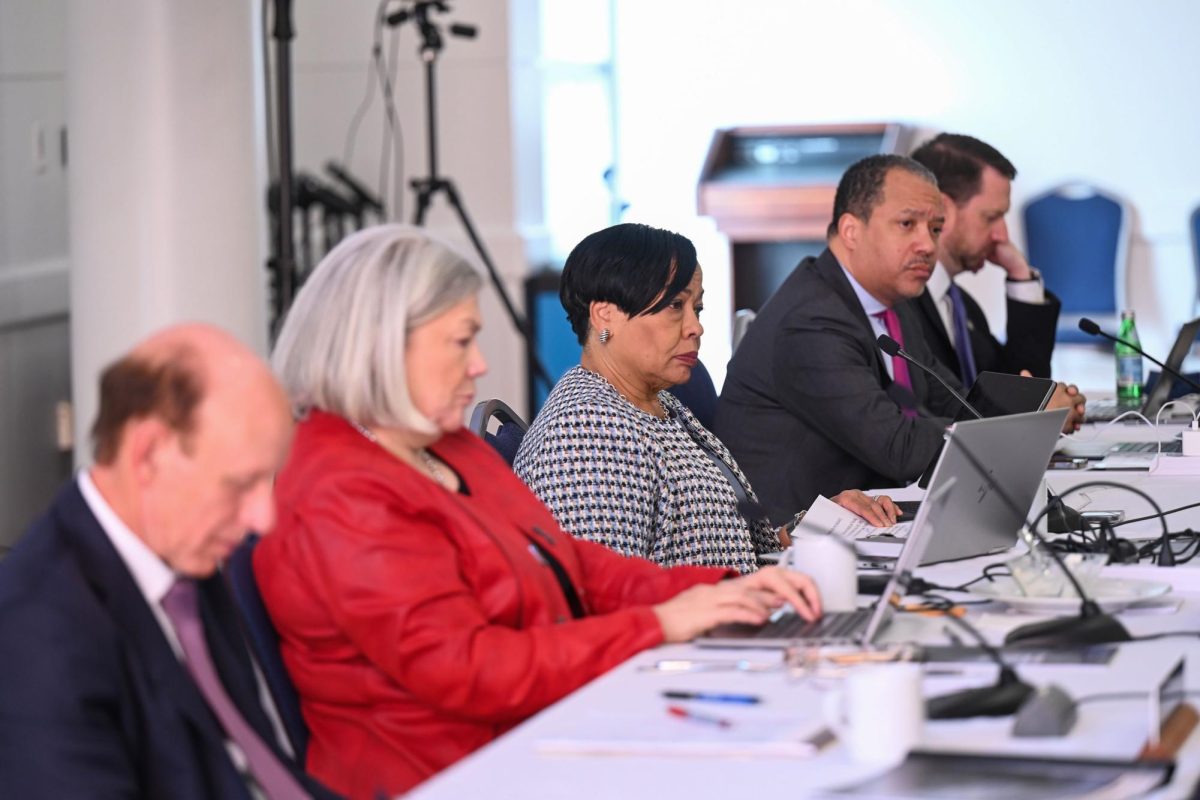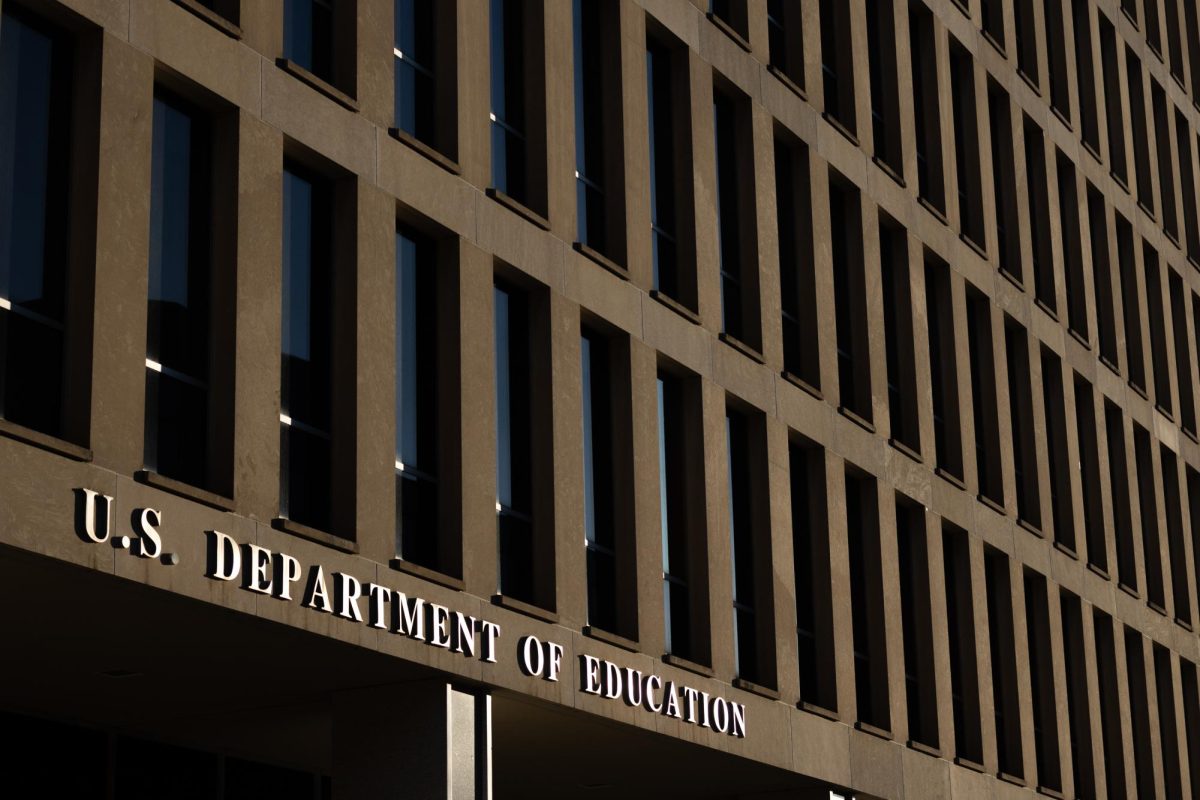A Jewish and pro-Israel advocacy organization filed a Title VI complaint Thursday with the Department of Education alleging that a professor was antisemitic toward Jewish and Israeli students in a graduate-level psychology course during the fall semester.
StandWithUs filed the complaint with the Office for Civil Rights, alleging Lara Sheehi, an assistant professor of clinical psychology, created a “hostile environment” for Jewish and Israeli students within her Diversity I course, part of GW’s Professional Psychology Program. The complaint alleges faculty and administrators “retaliated” with “disciplinary proceedings” against students who raised concerns about hostile conduct from Sheehi throughout the fall and a guest speaker and course materials that addressed the Israel-Palestine conflict.
The complaint alleges that the University violated Title VI, which prohibits discrimination on the basis of race, color or national origin in any “educational program or activity” that receives federal funds like GW.
“Jewish students informed the University about the harassment and discrimination they were experiencing,” the complaint alleges. “George Washington, however, failed to take prompt and effective steps to end the harassment and eliminate the hostile environment.”
The complaint calls on the University to null the “disciplinary proceedings” against the students who raised concerns and provide them with an alternative method of receiving course credit “out of Sherri’s orbit and influence.” The complaint also urges GW to investigate the discrimination allegations, institute mandatory bias and sensitivity training and use the International Holocaust Remembrance Alliance’s working definition of antisemitism to identify discrimination claims.
Sheehi, who has worked at GW since 2016, also taught a section of the Third Year Psychotherapy course in the Professional Psychology Program during the fall semester, according to the University’s schedule of classes. Sheehi is not scheduled to teach any classes this spring, according to the schedule of classes.
Sheehi did not return a request for comment.
Interim University President Mark Wrighton issued a statement to the GW community Friday saying a “third party” will investigate the claims, but he did not comment on the details of the allegations.
“I want to be clear that we reaffirm that the George Washington University strongly condemns antisemitism and hatred, discrimination and bias in all forms,” Wrighton said in the statement. “We remain committed to fostering a welcoming and inclusive environment where all feel safe and free of harassment, hostility or marginalization.”
University spokesperson Julia Metjian declined to comment on Sheehi’s employment status. She also declined to comment on StandWithUs’ allegation that students who complained about Sheehi were subjected to “disciplinary proceedings” or what the third-party investigation of the complaint’s claims will entail.
Metjian deferred to Wrighton’s public statement in response to The Hatchet’s questions.
Progressive organizations, like Jewish Voice for Peace, have criticized StandWithUs for its reported ties to the Israel government through its work with the government’s Ministry of Foreign Affairs on the country’s marketing materials.
“They are allegations and reflect the advocacy group’s perspective,” officials said in a now-expired Instagram story posted Thursday on GW’s official account. “The University will respond to OCR regarding any complaint it may receive from OCR.”
The complaint states that after a student said she was from Israel on the first day of the fall semester when Sheehi asked students in the course to share where they were from, Sheehi responded by saying, “It’s not your fault you were born in Israel.”
The complaint alleges that students continued to experience discriminatory actions at the Professional Psychology Program’s speaker event in September featuring a presentation from Nadera Shalhoub-Kevorkian, the chair of law at the Hebrew University of Jerusalem. During the presentation, Shalhoub-Kevorkian said Israel uses its humanitarian aid to distract from its “oppressive power,” a statement that students believed played into antisemitic stereotypes of Jewish people “using money for nefarious purposes,” according to the complaint.
Shalhoub-Kevorkian also allegedly argued in support of Palestinians throwing stones as a form of “violent resistance” against Israel during her presentation.
“It examines the framing, production and performance of security regimes that create and encourage systems of racialized oppression,” Shalhoub-Kevorkian said of the presentation in the flier for the September speaker event. She did not return a request for comment.
In the class following the speaker event, one Jewish student told Sheehi the presentation made her feel “vulnerable and unsafe” because she believed it “targeted” Israeli and Jewish people, according to the complaint. Sheehi allegedly replied by saying “in no uncertain terms, anti-Zionism is not antisemitism.”
The complaint states that students in the program received an email from a Columbian College of Arts and Sciences vice dean Oct. 22, which stated officials were aware of the criticism of Shalhoub-Kevorkian’s presentation and planned to host a discussion between students and faculty to address students’ concerns.
“As an institution of higher learning, we encourage robust debate on issues that impact our global society, but it is our expectation that all community members engage respectfully with one another, even when discussing issues that implicate deeply held beliefs,” the email states, according to the complaint.
The complaint states the Jewish students also raised concerns to Sheehi about three class readings, which included references to racist treatment against Arab and Muslim people and the Israel-Palestine conflict. The students said the readings portrayed Israel and Jewish people in a negative light “within the greater context of antisemitism in the class,” according to the complaint.
The complaint states students were frustrated that there were reportedly no required class materials covering antisemitism in their Diversity I course.
The complaint alleges that Jewish students from the course shared their criticisms of Sheehi with a staff member from the Professional Psychology Program in early October. They asked to fulfill the program’s diversity course requirement through other means, submit their classwork to another professor and invite a speaker to the program to give a presentation on antisemitism, according to the complaint.
The complaint states that the staff member allegedly told the students that he would sit in on Sheehi’s course, allow the students to submit their course work to him and invite a guest speaker to host a presentation on antisemitism. Later that month, he allegedly walked back those promises.
StandWithUs alleges that a student met a CCAS dean Oct. 26 and shared a joint letter signed by other Jewish students in the course explaining their “grievances” with officials from the school. The student reportedly told the dean that Jewish upperclassmen in the program reported they had also experienced antisemitism in Sheehi’s course years prior, according to the complaint.
The CCAS dean allegedly described the conflict as the result of “deeply held beliefs” and told the student who met with the dean that they could submit a bias report. In a separate Oct. 30 email to the student, the dean said they could either remain enrolled in the course or withdraw.
The complaint alleges the program’s faculty voted to subject the students who shared criticism of Sheehi with program staff members and the dean to “disciplinary proceedings.” The faculty allegedly threatened to place a “permanent negative mark” on the students’ academic records if they refused to explain “what harm they caused.”
A staff member from the psychology program refused a student’s request to appeal the disciplinary proceedings, the complaint states.
Carly Gammill, the director of StandWithUs’ Center for Combating Antisemitism, said the OCR will decide if it has the authority to examine the complaint before determining if the allegations constitute a Title VI violation. If a Title VI violation is found, the office will launch an investigation and consider terminating federal funding or referring the case to the Department of Justice, according to the DOJ.
“If and when a full investigation is open, then we would be notified of that, the University would be notified of that,” she said. “Then their investigation would proceed according to their protocols.”











